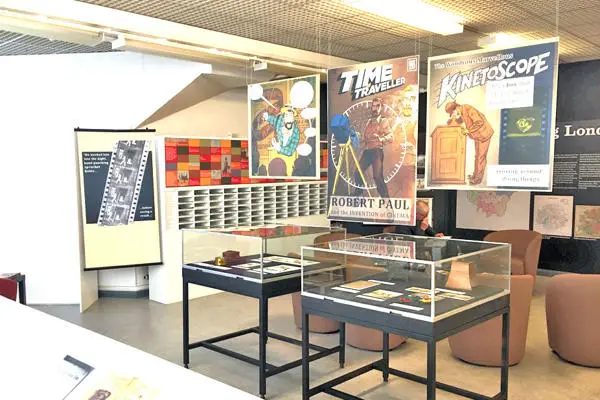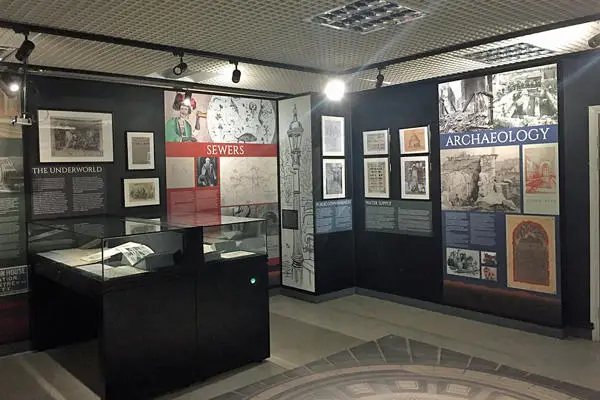Bridging the Digital Gap
London Metropolitan Archives through the eyes of a Bridging the Digital Gap trainee
Ash Ullah reflects on the first half of his 15 month Bridging the Digital Gap traineeship at LMA. The scheme is run by The National Archives and funded by the National Lottery Heritage Fund to bring new digital skills into the archives and heritage sector. If you have never worked in an archive before, getting started may seem a little intimidating, but Ash describes the on-the-job and online training, and mentoring that supports him, and gives insights into what he has learnt and experienced at LMA.
As part of the Bridging the Digital Gap traineeship run by The National Archives, I consider myself fortunate to be seconded to London Metropolitan Archives, based in Clerkenwell for 15 months. The first part of my remit was to support the film storage project, carrying out a series of quality checks on film mediums that will eventually be accessible on LMA Mediatheque. This focused on completing an audit of digital copies, updating the digital copy information in LMA’s cataloguing management system M2A and finally migrating the copies to the Mediatheque for eventual access. This helped me to develop my understanding of the collections management process of digitisation.

The main aim of the Bridging the Digital Gap scheme (funded by the National Lottery Heritage Fund) is to bring new digital skills into the archives and heritage sector. This will be achieved with a digital focus that provides supportive on-the-job training and an online training program via Moodle that has a series of modules designed to support my progression. If you have never worked in an archive before, getting started may seem a little intimidating, but a journey of a thousand miles begins with a single step!
I was impressed immediately with The National Archives as they conducted a three-day basecamp at Kew within two weeks of joining LMA. The basecamp involved an introduction to the archives sector and archive management principles. This would then help to guide me through the online modules on digital acquisition, preservation, access and engagement. It was also a great place to connect with the other trainee cohorts. One of the key things that I took away from the sessions was thinking together with the other trainees about some of the behaviours that will help make us successful in the workplace. Here, I felt it was important that it was explained what was expected of me as a trainee at LMA and how best to use the self-directed learning by keeping a learning log as a record of what I had done.
My first few weeks at LMA involved many introductions and studio tours, which gave me a fascinating insight into the ‘engine’ that runs the Digital Services team. Here, I began to understand that it was important to distinguish between ‘digitised’ and ‘digital’ items. In simplistic terms, any record such as paper-based material that has been converted to digital is a digitised record, whereby a digital record is one that is born-digital such as emails, Word and Excel documents; this means it started in its digital form.
I am fortunate to have archivist Daniel Albon to mentor me during my traineeship at LMA, giving me access to someone who has prodigious knowledge of the sector, willing to answer my questions where possible. He has directed me to some informative resources and recommended several key events that I should attend so that I get to meet like-minded people and industry peers who share a common discipline.
LMA holds many interesting free events and the first one that I attended was the Robert Paul exhibition tour. I particularly enjoyed the viewing of a working replica of the Kinetoscope that was on display. You can consider this as the earlier version of the cinema screens. I learned that Robert Paul started making Britain’s first moving pictures in the late nineteenth century and he was based near to the borough where I live! As a memento, I received the ‘Time Traveller’ graphic novel and managed to view some of Paul’s surviving films.

Another interesting session that I attended earlier on in my traineeship was in the late evening on ‘Unlocking Our Sound Heritage’. I listened to various speakers and contributors discussing their roles and responsibility to bring awareness to this community history project. I learned that it is important to put people at the fore front, to be recognised through a community history project via sounds and voices. This is all captured into a story with relevance for the past and the present.
Taking advantage of on the spot access to LMA exhibitions, I popped down to visit the ‘London Under Ground’ exhibition. I was impressed with how the team behind the exhibition managed to make good use of limited space but still captured the true essence of the topic through original documents, maps, images, and films. I learned about the history of London underground and its deep shelters, burial grounds, and tunnels.
I have always had a fascination with cameras and was able to attend a session on professional photography with Digital Imaging Assistant Steph Eeles. Here, I received an introduction to Nikon and Canon DSLR cameras, discussing different camera settings such as aperture, lens selection, angle view, tripod option, etc. As a result, we successfully captured photography of the LMA conference rooms to be viewed by future clients. Afterwards, we went into the studios to convert or digitise these images using Adobe Photoshop. Here, I learned about file structures and correct naming conventions which must be adhered to by following the LMA guidelines.
In response to the government advice to combat the COVID-19 (Coronavirus) pandemic, colleagues across LMA have been working at home and trying to find innovative solutions to carry out their duties. This is certainly an unprecedented situation which I have personally never encountered before in my working life! Coming from a digital trainee background, I was intrigued to see how LMA would tackle this from a ‘digital’ standpoint. From the start it was interesting to see teams within LMA finding creative ways to move forward, for example with listing online resources. Regular video/audio conferencing has kept people connected by being able to speak to each other, see each other, and share text and files.
As I am heading towards the half-way point of my traineeship at LMA, I have found archives has a positive ‘digital’ impact across society, especially on research and even challenging the pre-conceptions of the past. I am hoping to make the most of this traineeship opportunity when we slowly but surely return back to the office and move forward from these difficult times.